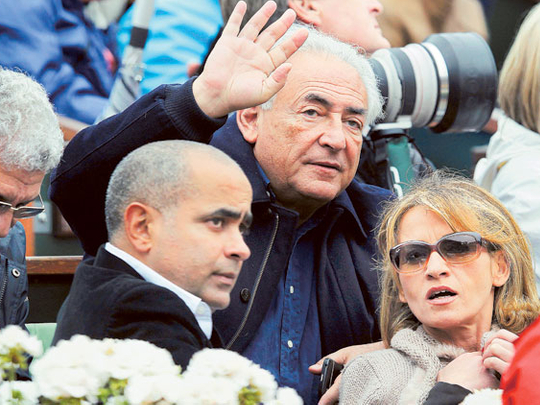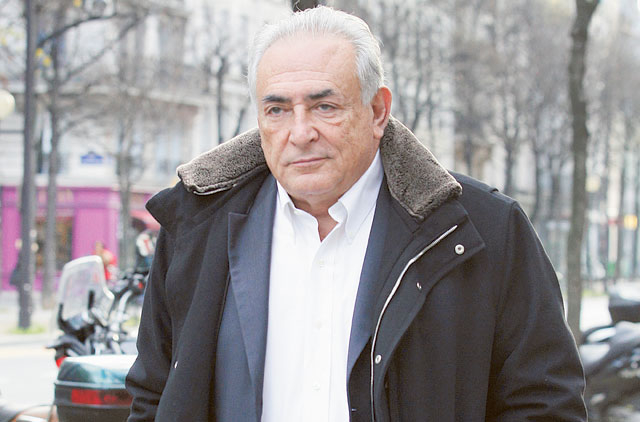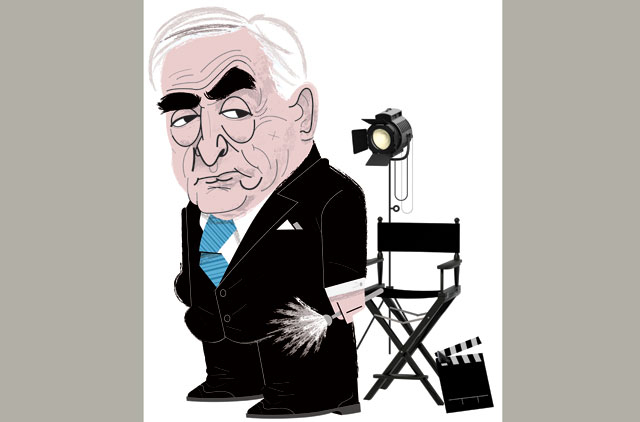
Dubai: There is a delicious French irony in that the leading man in a feature file inspired by disgraced international banker Dominque Strauss-Kahn is none other than Gerard Depardieu, a star sullied by his own brushes with the law and tax authorities.
Until New York police unceremoniously plucked him from an Air France flight heading to Paris in May 2011, Strauss-Kahn was a high flyer in global financial and political circles.
As head of the International Monetary Fund, the charismatic and then 63-year-old economist was widely considered to have invigorated the global financial body. He was also seen as the strongest Socialist Party contender to take on French President Nicolas Sarkozy in the 2012 election.
Those hopes and accomplishments, however, have taken a back seat to a series of sensational allegations of sexual misconduct. His personal life is in tatters, his financial career in shards, his political ambitions minced in the media, flavoured in the court of public opinion and fed to the dogs of the tabloid press.
Strauss-Kahn resigned from his IMF post in May 2011 days after Nafissatou Diallo, a maid at a Sofitel hotel in New York, came forward with allegations that the IMF chief had forced her to perform oral sex on him when she came to clean his hotel room.
Prosecutors eventually dropped the charges against Strauss-Kahn, which had included attempted rape and unlawful confinement, because they feared Diallo, a Guinean immigrant, undermined her credibility when she lied about her background and changed her account of the incident.
Was there really ever a hope that she would find justice against a man who had political connections from Warsaw to Washington, Moscow to Manila and Brazil to Beijing? Crying rape is one thing, proving it another — and even more so against such a dominating and power figure as the president of the IMF. What’s that expression – there is no smoke without fire. And sure enough, just as it seemed that Strauss-Kahn’s worst was behind him, he had more flames to put out. This time, the complainant was a French novelist, ending once and for all any hopes that he would mount a serious and credible campaign to lead the fifth French Republic.
Tristane Banon came forward after Strauss-Kahn’s arrest in New York to accuse him of wrenching open her bra and trying to unbutton her jeans in 2002. Lawyer David Koubbi said Banon had been dissuaded at the time from filing charges by her mother, a regional councillor in Strauss-Kahn’s Socialist party.
Last year Strauss-Kahn and Diallo reached an out-of-court settlement for an undisclosed sum.
Strauss-Kahn maintained that the sexual encounter was consensual, saying in a TV interview that he “regretted his moral error”.
But were his actions those of a powerful man who sought to gain sexual favours against weaker women? Or was there something more pervasive about his actions?
Strauss-Kahn found himself in hot water again in February 2012 when French police took him into custody in connection with their investigation of a prostitution ring they suspected was being run out of a luxury hotel in the city of Lille in northern France.
They questioned Strauss-Kahn for two days about allegations several prostitutes had made that they had had sex with him in 2010 and 2011 at sex parties organised at hotels in Lille, Paris and Washington, D.C.
Police are investigating whether the women at the parties were paid using corporate funds from a large French construction company and whether Strauss-Kahn knew they were prostitutes.
Eight people have been charged in the case, including executives at the Carlton Hotel in Lille, a well-known lawyer, the local deputy police chief and two businessmen who are acquaintances of Strauss-Kahn.
Known as “DSK” in the French press, the former Socialist finance minister was born in the wealthy Parisian suburb of Neuilly-sur-Seine.
Some of his early years were spent in Morocco, but after an earthquake there, his family moved to Monaco. They later returned to Paris, where he attended school, eventually obtaining a law degree and graduating with a PhD in economics from the University of Paris. He has also studied business administration, political science and statistics.
He joined France’s Socialist Party in 1976 and was elected to the National Assembly in 1986.
From 1991 to 1993, he was minister of industry and international trade.
Two years later, he was elected mayor in the poor Parisian suburb of Sarcelles and later devised the economic policy that helped propel the Socialists to power and Strauss-Kahn to the post of finance minister in 1997.
In that role, which he held until 1999, he managed the launch of the euro. He resigned after being involved in a Socialist Party funding scandal. He was subsequently acquitted.
Strauss-Kahn also served as personal adviser to the secretary general of the Organisation of Economic Co-operation and Development and has taught economics at the Institut d’études politiques de Paris.
Between 2001 and 2007, he was elected three times to the National Assembly.
In 2007, he became the 10th managing director of the IMF, leaving Paris for Washington and later earning international praise for his guidance at the organisation’s helm during the global economic downturn.
His private life, however, has not been without controversy. Strauss-Kahn’s extramarital affairs have long been considered an open secret and have gotten him in trouble in the past.
The thrice-married father of four apologised for “a serious error in judgement” after the IMF investigated him over a possible abuse of power involving a brief relationship with an IMF subordinate. He was cleared in that incident.
Strauss-Kahn’s first marriage came at 18 to his high school sweetheart. He married his second wife in 1984. His third wife, French television journalist Anne Sinclair, stood by him during the IMF investigation and came to his defence after the maid’s allegations of attempted rape surfaced.
In a statement made to the French news agency AFP at the time, the New York-born Sinclair said: “I do not believe for one second the accusations brought against my husband. I have no doubt his innocence will be established.”
Out of court settlements, however, certainly question the veracity of that innocence.
C’est la vie!
--with inputs from agencies














